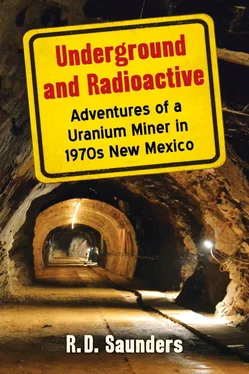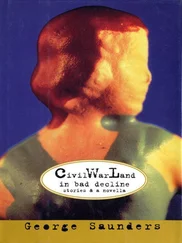I was very happy to find that Riordan had gotten some ventilation into the heading and decided that if I did nothing else, I would be sure that vent tube kept up with our progress.
Getting assigned as a miner’s helper on the track drift carried with it a certain level of prestige among the laborers. Some track drift helpers averaged more per hour than a stope miner might make. That was possible because of the contract system that miners working for Kermac were paid under.
Rather than pay an hourly wage, Kermac paid a miner for everything he or she did. Everyone else was on an hourly wage. Each task, no matter how small, had a set price that the miner was paid. Be it setting a single rock bolt, driving a wedge, producing carloads of ore, or constructing timber sets, all the tasks performed during a two-week period were added up and then divided by the number of hours a miner worked to come up with an average hourly contract rate. Miners then had the option of keeping all the contract hours for themselves or giving some of those hours to their helpers.
Contract rate varied from day to day, and the helper, who was usually doing the brunt of the heavy labor, had a big part in this. Some miners were stingy with their contract time and would give only an hour or two per day to their helper, but the good miners always gave the maximum four hours per day.
There was a lot of incentive built into the contract system, because the more you did as a miner, the more you got paid.
Not every mining company in the Ambrosia Lake area used a contract system, with many paying a straight hourly wage. I heard a lot of complaints about other mining companies’ hourly wages from some new hires that showed up at Section 35.
I never knew a miner to lie about what he had done, and only once, when a miner reported a $2,500 shift, did I see a shift boss question what a miner accomplished in a day—and that miner was me.
As with many of the most experienced and highly paid miners, Al Riordan was in his prime. Thirty-three years old, he was a rough, sinewy, hardened guy with the heavily muscled forearms and strong, thick hands and fingers I often saw on miners. Dark complexioned with jet-black hair, Al always seemed to need a shave, which gave him an especially rugged appearance long before that look was cultivated by the fashion conscious.
Al was one of the chain smokers at Section 35 who never seemed any more concerned with regulations than he was with blowing himself up, or about the proven connection between radon and lung cancer, about which, we had all been repeatedly warned. The way he always smoked when working with powder scared the crap out of me. In that respect he and Schultz were alike.
I hadn’t spoken much to Riordan, but he knew who I was and seemed friendly enough. As I approached him, I had no illusions of getting any contract hours, but this was certainly an opportunity to prove that I could work hard, keep quiet, and follow instructions, all of which I intended to take advantage of.
With a cigarette dangling from the corner of his mouth, he greeted me. “Ready to get to work?”
“Yup.”
“Let’s get to it then.” And with that my real education in mining began.
Our second twenty-one-day stay at the Coal Mine campground was nearing an end when the forest rangers paid Greg and me a visit.
As I mentioned, the campground was full every night of the week with more and more transients like Greg and me, which was something the rangers had noticed. We were told in a friendly way that we would have to check out and stay checked out. There would be no turn-around check-in this time. As with many other things that happened up there in the forest, I wasn’t sure they could legally do that. It might have been legal, but even if it wasn’t, we had little recourse.
We were weighing our options, which more accurately meant only one: become squatters in the surrounding forest. Leaving Coal Mine for a place in the forest where there was no water, no shade, no table, no bathrooms, and no roads wasn’t something I was looking forward to after the relative luxury of the campground. Not the best prospect, but it was all we had. As we were contemplating our move, things got worse.
Greg and I both had come off of a four o’clock to midnight swing shift. Dead tired, we crawled into our respective sleeping bags and quickly drifted off. Not long after that, I was awakened by an awful-sounding scream the likes of which I hadn’t heard before. At first I thought it might be an animal in the campground but couldn’t really make out what kind. I looked over at Greg, who by now was also awake, and asked what he thought it was.
Then we both heard what sounded vaguely like a call for help, so I jumped up and without getting dressed charged out of the tent. Not a good move.
With my first step, my bare right foot landed on a cactus. I might have screamed but thought better of it upon seeing the silhouettes of two people, one holding a pistol and one a shotgun, pointed at each other, in a campsite about a hundred feet away.
By this time Greg was outside the tent too, but he’d had the good sense to put some shoes and pants on, so he didn’t suffer my fate.
By either moon or starlight, it was fairly bright that night, so I could see a little of what was happening. I could also hear some of what was being said, but not much. It became clear that the man holding the shotgun was a camper who had also been awakened by the screaming and had confronted the man holding the pistol.
They say if you point a weapon at someone, you’d better be willing to use it, but obviously the holder of the shotgun was not because the man with the pistol raised his arm as if to shoot, and the camper with the shotgun just stood there.
I was expecting to hear a shot at that point, but fortunately there was none. Instead, the man with the pistol began to beat on the shotgun holder using the butt of the pistol.
Most evenings locals from Grants, mostly youngsters, would come up to the campground and cruise through, rarely stopping for anything or bothering anyone. That usually went on all night, even at 1:00 a.m. It so happened that one of those cruisers was coming down the road past our campsite. Greg and I flagged down the car and asked for a ride around the campground. Our hope was to get a license plate number without being discovered. The young high-school-age driver agreed, so we hopped in, me in my underwear and bare feet and Greg dressed properly, and around the campground road we went.
We were unable to discover any information after a single pass, so the cruiser dropped us off again at our campsite. We asked the driver to go to town for help. I figured a good driver could get into town and either to the police station or call for help in about fifteen minutes.
Having absorbed a pistol whipping, the man with the shotgun had recovered, and the two of them were in a standoff again. It was fortunate that to this point nobody had been shot, but we could still see each of them pointing their weapons at each other. I still couldn’t catch much of the conversation myself, and neither of us was anxious to get much closer to listen in. We just waited and hoped that the police would arrive.
About a half hour had passed since the cruiser had left for town promising to get help when, sure enough, a couple of sheriff’s deputies arrived on the scene. That ended the standoff as one woman and two men were taken into custody, including the pistol and shotgun owners.
More deputies arrived and began questioning campers. When they came to us, we told our story and became witnesses who had to give statements, so we were taken into Grants to do just that.
It turned out a couple of men who had been in town for trial on armed robbery charges had taken time out from that to kidnap a local girl, whom they then brought to the campground to rape. What made it even worse was the girl had obvious mental disabilities. It was she who had been doing the screaming, and why so much of the little we could hear was unintelligible.
Читать дальше












